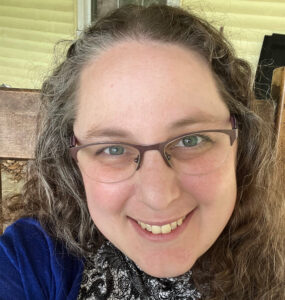A Point of Pride: Interview with Ruth Anna Evans

Ruth Anna Evans is a writer, anthologizer, and cover designer who lives in the heart of all that is sinister: the American Midwest. She has been composing prose of all types since childhood but finds something truly delightful in putting her nightmares on the page. She has self-published the horror collection No One Can Help You: Tales of Lost Children and Other Nightmares, along with novellas, novelettes, and several short stories. She is the editor of Ooze: Little Bursts of Body Horror. Her work has also appeared in Livestock: Tales from the Un-herd, Deadly Drabbles by Hungry Shadow Press, and she will have work appearing in Dark Town, an anthology from D&T Publishing.
Follow Ruth Anna on Twitter, on Facebook, on Instagram, or at her website for updates on her work.

What inspired you to start writing?
I’ve written since childhood off and on. My bachelor’s degree is in writing, and I was a newspaper reporter for several years. But I never had much luck at fiction until about 2020. I was having huge amounts of anxiety about the pandemic and didn’t have any outlet for them. Instead of going stark raving mad, I began a story. It took me months and months to get that first novella out, but once I did, and once I realized it was horror, the floodgates were open. Writing brings so much meaning to my life. And when people read your writing and connect with it in some way, that’s even more meaningful. It just builds and builds.
What was it about the horror genre that drew you to it?
Horror, for me, is all about processing a world that is just too awful to contemplate without the buffer of fictional stories. I have always been incredibly soft-hearted about the horrific things that happen to people; I can’t read or watch certain things or it just overtakes my brain. In fiction, though, I can let some of those horrors out of my mind. It gives me some peace.
Do you make a conscious effort to include LGBTQ material in your writing and if so, what do you want to portray?
My characters, to me, feel like people I know, and a lot of the people I know are not straight. So it would be weird if none of my characters were LGBTQ. When I portray an LGBTQ character, it is important to me that they are whole people, not defined by their gender identity or sexuality. Sometimes it’s an important part of the plot, other times it’s completely incidental. The bottom line for me is that love is love and people are people, whether in real life or in my stories.
What has writing horror taught you about the world and yourself?
Horror has taught me that I am a deeply dark person, and I find that fascinating and fun. I’ve learned that there’s nothing wrong with darkness. Pain is a part of the human experience that can connect us to others. Being open to the things that hurt or scare us can make our lives more full.
How have you seen the horror genre change over the years? And how do you think it will continue to evolve?
I am pretty new to the horror genre, but I’m excited to see bookstores bringing in fresh voices, and it’s amazing how many people are publishing quality work on their own and through small presses. I joined horror at a really exciting time, and I think it’s going to keep getting better and better.
How do you feel the LGBTQ community has been represented thus far in the genre and what hopes do you have for representation in the genre going forward?
I think that a lot of general readers don’t realize how queer horror can be, and I’m excited to hear the voices of LGBTQ people shining out right now with so much pride. Seeing people seek out queer authors is amazing. In my little corner of the Internet, being LGBTQ isn’t out of the norm at all, and I love that horror has carved out that place. I want it to grow. I want queer voices to be just as much a part of the mainstream as cis-het voices.
Who are some of your favorite LGBTQ characters in horror?
I loved Moira in Handmaid’s Tale. My story, Insurrection, in We’re Here: An Anthology of LGBTQ+ Horror sort of echoes her, as it’s a dystopia centering on a gay married couple. I enjoyed the title character in Dani¸ by Angelique Jordonna, and how she was both a villain and a heroine.
Who are some LGBTQ horror authors you recommend our audience check out?
If you like extreme horror and you aren’t reading Judith Sonnet, you’re missing out. I also recommend Angelique Jordonna, David-Jack Fletcher, and Mick Collins.
What is one piece of advice you would give horror authors today?
Connect. Find horror friends. Support them. And practice your craft. You have to write to be a writer. Give yourself that minimum word count and hit it. Keep hitting it. Share your writing, and listen to any advice you are offered. Don’t be discouraged by rejections and low sales; it’s a part of the business. Just because you see someone getting success doesn’t mean they didn’t spend years where you are. Every little win is worth celebrating.
And to the LGBTQ writers out there who are just getting started, what advice would you give them?
There are safe spaces in the horror community for LGBTQ people, and it’s okay to live there when you’re online. Block the haters with a vengeance. There is no need to expose yourself to garbage to be successful. It’s not worth the trade-off. Protect your peace.



